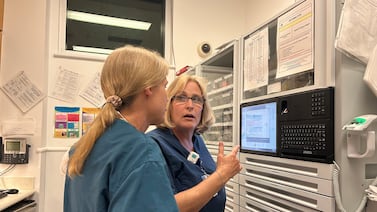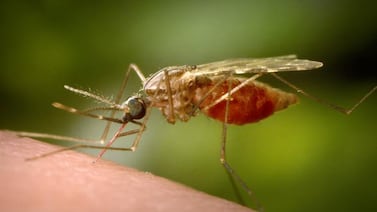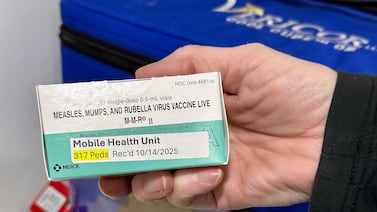This story has been updated with a new case of bird flu in a backyard flock.
Public health, explained: Sign up to receive Healthbeat’s free Atlanta newsletter here.
Chicken enthusiasts with backyard flocks are believed to number in the thousands in Georgia. With bird flu confirmed in a Henry County flock last week, people keeping fowl as a hobby are urged to take some precautions.
“Chickens are everywhere in Atlanta,” said Heath Ward, who owns CityChick, a local backyard farm supply company. His business increased during the Covid pandemic in 2020 as people looked for at-home hobbies. Now he makes his living delivering chicken supplies to families all over the metro area.
Matthew Agvent, spokesperson for the state Department of Agriculture, said his agency doesn’t have the exact number of backyard flocks, but “It would be safe to say that number is well into the thousands.”
H5N1 has been detected in two backyard flocks this year, one in Henry and one in Clayton County. The disease was also found at two commercial poultry farms in Elbert County in January.
The Centers for Disease Control and Prevention has confirmed 70 human cases in the United States since 2024 – none in Georgia. The first human death was reported in January in Louisiana, in an elderly person who had other underlying health conditions and was likely exposed via a backyard flock.
A report from the U.S. Centers for Disease Control and Prevention published Thursday said no source of exposure could be identified despite extensive contact tracing in a San Francisco child who came down with bird flu earlier this year. There was no evidence of human-to-human transmission.
Ward said he would still encourage people to get backyard chickens if they are considering it – but emphasized that new owners should read up and be prepared to implement biosecurity practices like using separate shoes for the chicken coop area.
“Too many people just ‘wing it’ and try to figure it out as they go,” Ward said.
Other experts advised waiting. Backyard flocks can be exposed to bird flu via droppings from wild birds.
“Biosecurity … takes a lot of effort to do it well, and especially if you’re new to this,” said Meghan Davis, a professor at Johns Hopkins Bloomberg School of Public Health.
“If all you have is just a screen, you can still sometimes get exposure that way, so you sometimes need to have a little bit more infrastructure to be able to manage that,” Davis said.
Ward’s business is entirely online, in part to minimize the risks of chicken flock owners from spreading diseases at a store.
“It’s a good idea to wear a separate pair of boots to the feed store,” he said.
Andrew Pekosz, a professor of microbiology and immunology at Johns Hopkins Bloomberg School of Public Health, advises waiting to bring home chickens.
“It might be prudent to wait a few weeks, as the outbreaks of H5N1 seem to be stemming from migratory birds moving south in particular parts of the country,” he said. Backyard chicken flocks typically do not live in completely enclosed areas, putting them at risk of contact with wild birds.
To keep bird flu from spreading to humans, people are urged to keep from touching dead birds with their bare hands. Use gloves and dispose of the dead birds in double plastic bags, Agvent said.
Some of the main symptoms of bird flu in humans include fever, cough, sore throat, and pink eye (conjunctivitis). If a health care provider identifies a human case, it must be reported to the state within seven days.
The Georgia Poultry Laboratory Network is helpful for all kinds of poultry owners, Ward said. He encourages bird owners to use the lab’s necropsy service if they have dead birds. The service is free to private owners.
“They do amazing work,” he said. The lab has a bird flu hotline that can be accessed online or by calling 770-766-6850.
Tips for reducing threat in home flocks
Dr. Katelyn Jetelina of Your Local Epidemiologist, a Healthbeat partner and supporter, offers these tips for backyard chicken owners to reduce the risk of bird flu spread.
- Keep your flock contained: Isolate your birds from visitors and other birds.
- Prevent germs from spreading by cleaning shoes, tools, and equipment.
- Reduce the risk of transmission by avoiding sharing tools and equipment with neighbors.
- Know the warning signs of infectious bird diseases among the flock, including fatigue, abnormal drop in egg production, swelling or discoloration of the eyelids/comb/wattles/shanks, stumbling or falling down, diarrhea, or unexplained death.
If one of your birds is sick or dies unexpectedly:
- Avoid contact with the sick or dead bird. Assume other birds in the flock and their enclosures, droppings, feeders, and water sources are also infectious. (If you can’t avoid contact completely, take steps to protect yourself.)
- If possible, isolate the bird from other animals and pets. (Don’t let your dog near it.)
- Immediately report sick or dead birds to the Georgia Department of Natural Resources at 1-800-366-2661 or the U.S. Department of Agriculture at 1-866-536-7593.
What about bird feeders?
Birds that gather at feeders (like cardinals, sparrows, and bluebirds) do not typically carry H5N1. The USDA does not recommend removing backyard bird feeders for H5N1 prevention unless you also care for poultry. The less contact between wild birds and poultry (by removing sources of food, water, and shelter), the better.
Rebecca Grapevine is a Healthbeat reporter in Atlanta. Contact Rebecca at rgrapevine@healthbeat.org.






